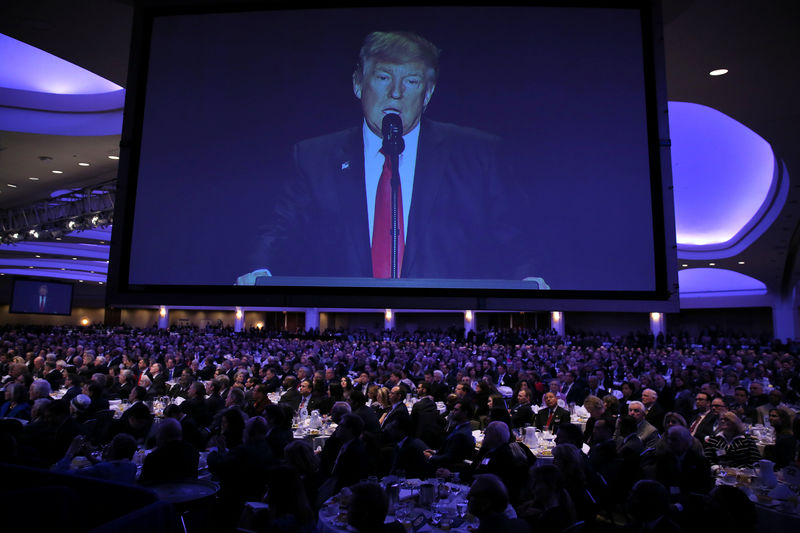By Jeff Mason and Roberta Rampton
WASHINGTON (Reuters) - President Donald Trump on Thursday vowed to free churches and other tax-exempt institutions of a 1954 U.S. law banning political activity, drawing fire from critics who accused him of rewarding his evangelical Christian supporters and turning houses of worship into political machines.
As Trump used a prayer breakfast to take aim at a long-standing statutory barrier between politics and religion called the Johnson Amendment, civil liberties and gay rights groups expressed concern that he might consider an executive order to allow government agencies and businesses to deny services to gay people in the name of religious freedom.
Trump did not reference such an order in his remarks. But he lambasted the Johnson Amendment, which prohibits tax-exempt organizations such as churches and other places of worship, charities and educational institutions from directly or indirectly participating in any political campaign in favor or against a political candidate.
"I will get rid of and totally destroy the Johnson Amendment and allow our representatives of faith to speak freely and without fear of retribution. I will do that, remember," Trump told U.S. politicians, religious leaders and guests including Jordan's King Abdullah at the annual National Prayer Breakfast.
White House spokesman Sean Spicer told reporters Trump wanted to find ways to make sure people were not penalized for following through on their religious beliefs.
A draft executive order on "religious freedom" circulating among advocacy groups would allow government officials to deny marriage licenses to gay couples and let businesses withhold services from gay people, activists said.
The White House said it was not working on such an order.
Trump previously spoke out against the Johnson amendment during the campaign and won the support of evangelical Christian leaders including Liberty University President Jerry Falwell Jr.
A change in the law would require action in the Republican-led U.S. Congress, and Republican lawmakers introduced legislation that would reverse the policy.
After Trump's remarks, Republican House of Representatives Speaker Paul Ryan told reporters he has "always supported" eliminating the Johnson Amendment.
Critics including the group Americans United for Separation of Church and State expressed alarm.
"President Donald Trump and his allies in the religious right seek to turn America's houses of worship into miniature political action committees," said the group's executive director, Barry Lynn.
"It would also lead some houses of worship to focus on supporting candidates in exchange for financial and other aid. That would be a disaster for both churches and politics in America," Lynn said.
Peter Montgomery of the liberal advocacy group People For the American Way said Trump wants to pay back religious conservatives who helped get him elected "by letting them turn their churches into political machines with tax-exempt charitable dollars."
Scrapping the Johnson Amendment has been a goal of Christian conservatives, who contend it violates free speech and religious freedom rights. The U.S. Constitution's First Amendment guarantees freedom of religion and bars the government from establishing an official religion.
"We are encouraged to see that President Trump understands the very real constitutional violation posed by the Johnson Amendment and that he is committed to restoring a pastor's right to speak freely from the pulpit without fearing government retribution," said Erik Stanley, senior counsel for the conservative Christian legal group Alliance Defending Freedom.
'PRAY FOR ARNOLD'
Trump used the opening moments of the usually solemn prayer breakfast to deride actor Arnold Schwarzenegger, his successor on a reality TV show, for his viewership ratings.
Trump said Schwarzenegger, the Republican former governor of California, had disastrous ratings on the NBC reality TV program "Celebrity Apprentice," which Trump previously starred in.
"They hired a big, big movie star, Arnold Schwarzenegger, to take my place. And we know how that turned out," Trump said. "It's been a total disaster. ... And I want to just pray for Arnold if we can, for those ratings, OK?"
Schwarzenegger, who endorsed Ohio Governor John Kasich over Trump for the Republican presidential nomination, shot back, alluding to the controversies of Trump's first two weeks in office.
"Hey Donald, I have a great idea," Schwarzenegger said in a video. "Why don't we switch jobs? You take over TV, because you're such an expert in ratings, and I take over your job. And then people can finally sleep comfortably again."
Spicer later called Trump's remarks "light-hearted" and part of an "absolutely beautiful" speech.
Trump a week ago put a 120-day halt on the U.S. refugee program, barred Syrian refugees indefinitely and imposed a 90-day suspension on people from seven predominantly Muslim countries: Iran, Iraq, Libya, Somalia, Sudan, Syria and Yemen.
Trump defended his directive on Thursday as crucial to ensuring religious freedom and tolerance in America, and said he wanted to prevent a "beachhead of intolerance" from spreading in the United States. He also called terrorism a fundamental threat to religious freedom.
"The world is in trouble, but we're going to straighten it out. OK? That's what I do. I fix things," Trump said.
"When you hear about the tough phone calls I'm having, don't worry about it," Trump added, apparently referring to telephone conversations including one with Australian Prime Minister Malcolm Turnbull.

"It's time we're going to be a little tough folks. We're taken advantage of by every nation in the world virtually. It's not going to happen anymore," Trump said.